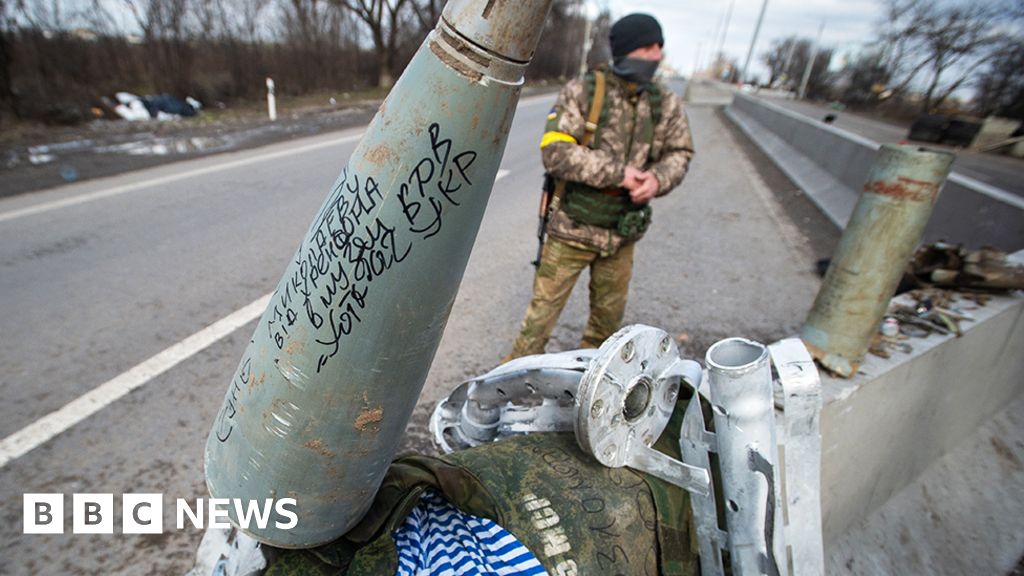
This video can not be played
To play this video you need to enable JavaScript in your browser.
The US will send Ukraine a cluster munitions package to help in its counteroffensive against Russia.
The White House said it had postponed the decision for as long as it could because of the risk of civilian harm from such unexploded ordnance.
Ukraine has been asking for the weapons for months amid an ammunition shortage.
Cluster munitions - which are banned by more than 100 countries - are a class of weapon that contain multiple explosive bomblets called submunitions.
US President Joe Biden said in a cable TV interview that it was "a very difficult decision on my part" to send the bombs.
"I discussed this with our allies," he told CNN, "I discussed this with our friends up on the [Capitol] Hill."
He said he had decided to send the munitions because "the Ukrainians are running out of ammunition".
Mr Biden could face questions from allies about the matter at a Nato summit in Lithuania next week.
National Security Adviser Jake Sullivan told Friday's daily White House briefing: "We recognise the cluster munitions create a risk of civilian harm from unexploded ordnance.
"This is why we've deferred the decision for as long as we could."
He added: "Ukraine would not be using these munitions in some foreign land. This is their country they're defending."
Mr Sullivan said Ukraine was running out of artillery and needed "a bridge of supplies" while the US ramps up domestic production.
"We will not leave Ukraine defenceless at any point in this conflict period," he said.
This video can not be played
To play this video you need to enable JavaScript in your browser.
The munitions are controversial because of their failure, or dud, rate, meaning unexploded bomblets can linger on the ground for years and detonate later on.
Mr Sullivan told reporters that the cluster munitions America will send to Ukraine have a dud rate of less than 2.5%, describing that as far below Russia's cluster munition dud rate, which US officials say is between 30-40%.
In a separate news briefing, the Pentagon did not specify how many cluster munitions the US will send to Ukraine, but spokesman Colin Kahl said they had "hundreds of thousands available".
US law prohibits the transfer of cluster munitions with bomblet failure rates higher than 1% - meaning more than 1% of the bomblets in the weapon do not explode - but President Biden is able to bypass this rule.
A United Nations investigation found Ukraine has probably already used cluster bombs, though the country has denied doing so.
Early on in the war, the White House was asked about allegations that Russia was using cluster bombs, and then-press secretary Jen Psaki said it would be a "war crime" if true.
Officials are planning to send artillery shells to Ukraine, with each containing 88 separate bomblets, according to US media reports. They would be fired from Howitzer artillery weapons already deployed by the Ukrainian army.
The Biden administration's latest weapons package for Ukraine is worth $800m (£626m). It includes Bradley and Stryker fighting vehicles, air defence missiles and anti-mine equipment.
Human rights groups have urged Russia and Ukraine not to use cluster munitions and have asked the US not to supply them.
In a statement on Friday, the Office of the United Nations High Commissioner for Human Rights once again called on the countries not to use cluster bombs, arguing they were dangerous.
"Cluster munitions scatter small bomblets over a wide area, many of which fail to explode immediately," said office spokesperson Marta Hurtado. "They can kill and maim years later. That's why use should stop immediately."
Some US lawmakers have also asked the Biden administration not to send the weapons, arguing their humanitarian costs outweigh their benefits in the battlefield.
Defence Department official Laura Cooper told Congress last month that military analysts had found that cluster bombs would be "useful, especially against dug-in Russian positions".
More than 120 countries have committed to the Convention on Cluster Munitions, agreeing not to use, produce, transfer or store such devices.
The US, Ukraine and Russia are not party to the agreement.
Related Topics
World - Latest - Google News
July 08, 2023 at 03:20AM
https://ift.tt/3onfLvM
US plans to send controversial cluster munitions to Ukraine - BBC
World - Latest - Google News
https://ift.tt/InUxpCT

No comments:
Post a Comment